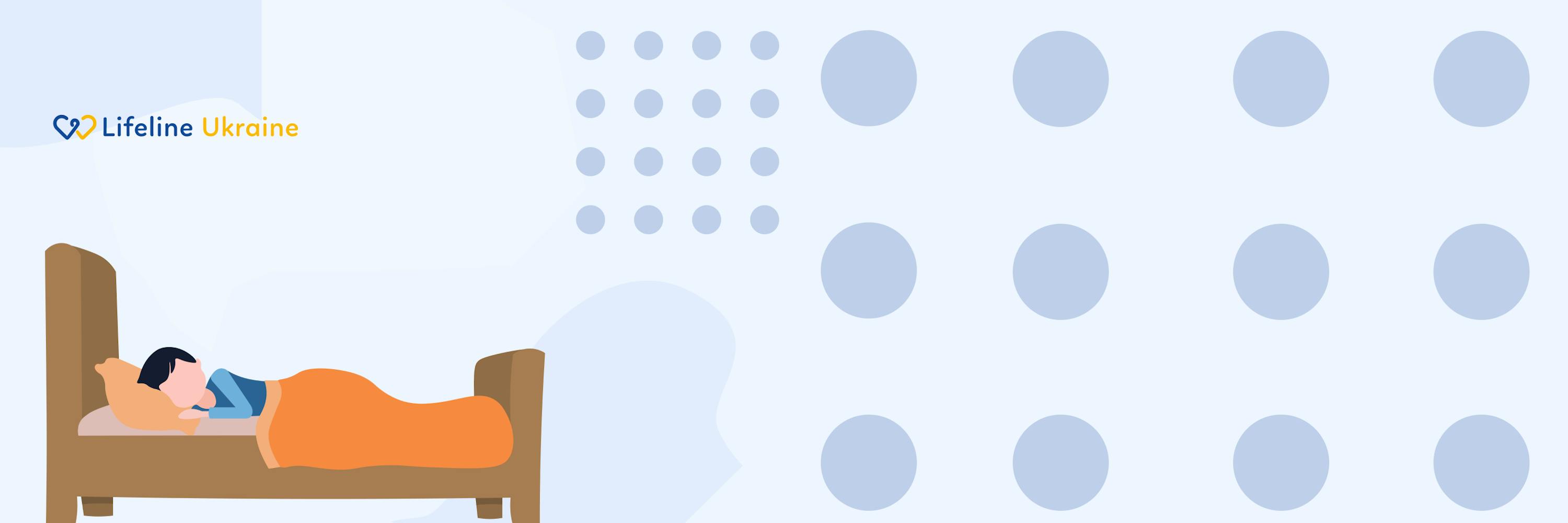Sleep is an important aspect of human physiology and psychology, and it has a significant impact on health and mental well-being. Monitoring sleep quality during wartime is especially crucial.
The impact of bad sleep
During war, crises, and disasters, people's stress levels increase significantly. Sleep disturbances can worsen psychological conditions and contribute to the development of post-traumatic stress disorder (PTSD) and other mental disorders. Sleep disturbances can lead to a weakened immune system, exacerbation of chronic diseases. It is important to stay healthy and be able to make timely decisions and ensure the safety of oneself and others.
Sleep is a time when the body recovers and gains strength. In stressful situations, it is important to have additional physical and psychological resources to process emotions and maintain the potential to cope with dangerous situations. Quality sleep helps replenish these resources.
Sleep disturbances can affect psychological state and interaction with others, provoke conflicts due to irritation and unreasonable aggressiveness. No matter how much the rhythm of life is disrupted, it is important to adhere to natural biorhythms and sleep according to circadian rhythms, or simply put, our internal biological clock.
In difficult times, quality sleep is especially necessary for physical and psychological survival. It helps a person maintain resilience, remain determined, and effectively overcome the difficulties that constantly arise in wartime conditions.
What exactly happens to us during sleep?
The restoration of physical and mental health takes place. During sleep, processes of cell regeneration and repair occur, protein synthesis happens, and the brain is cleansed of toxins. This process occurs thanks to the activation of the lymphatic system, and it works most actively during sleep. Disruption of this process can be associated with an increased risk of developing neurodegenerative diseases, such as Alzheimer's disease.
The processes of cell and tissue regeneration are activated during sleep, which is especially important for the growth and maintenance of organs and systems. For example, sleep aids muscle recovery after physical activity.
The effect on well-being
Adequate sleep strengthens the immune system. Important cells and immune response factors are activated during sleep, helping the body fight infections and protect against various diseases.
Sleep is also a time when protein synthesis, which is necessary for the growth and functioning of the body, occurs. This is important for regulating hormonal balance. For example, growth hormones are mainly produced during sleep, and this is important for children as they grow up.
During sleep, breathing becomes deep due to muscle relaxation, reduced consciousness, and control. These factors are the foundation of distress when we are tense, constantly anxious, and monitoring threats and dangers. Therefore, sleep allows the body to be saturated with oxygen, activating the parasympathetic nervous system, which is responsible for rest and recovery.
Sleep helps to restore emotional resilience, providing rest for the brain and the mental system. Insufficient sleep can lead to a worsening mood, irritability, and decreased concentration. In such states, it is impossible to remain collected and productive.

The role of sleep in human life
Sleep affects cortisol levels
Cortisol is a hormone produced by the adrenal glands in response to stress. Studies show that regular and quality sleep helps reduce the level of cortisol, which is even called the
Insufficient sleep is associated with an increased risk of developing depression, anxiety disorders, mood disorders, and impaired cognitive functions.
1. Many studies have established a link between insufficient sleep and the risk of developing depression and anxiety disorders. Insufficient sleep can lead to dysfunction of neurotransmitters such as serotonin, known as the mood hormone. As we have already discussed cortisol, research has shown that insomnia or poor-quality sleep often leads to increased symptoms of anxiety disorders.
2. Inadequate sleep can lead to a deterioration of mood and cognitive functions. People who do not get enough sleep feel irritable and are prone to a lowered mood. Their ability to make decisions, concentrate, and solve problems—which are essential for handling life's challenges during a crisis—diminishes.
3. Lack of sleep and interrupted sleep affect the functioning of the amygdala, the brain structure responsible for processing emotions, which automatically leads to increased vulnerability to stress.
So, when we know why something is important and what mechanisms are involved, we can influence it within our zone of control. Obviously, you can't sleep during a bombardment, but you can dedicate an hour or two to recovery during the day by being kind to yourself.
The impact of sleep on memory
When sleep is disturbed, a person does not have the opportunity to experience dreams. Dreams that occur during REM sleep (Rapid Eye Movement phase) play an important role in psychological processes such as memory, creativity, and emotional processing.
During REM sleep, the repetition and consolidation of important pieces of information and knowledge can occur, which contributes to better memory retention and skill improvement.
Dreams as a source of unexpected ideas and solutions
Dreams can help solve tasks and problems that arise during the learning process. Some famous stories testify to how dreams facilitated the solving of creative tasks and problems. For example, the famous chemist August Kekulé discovered the structure of the benzene ring during a dream where he saw a snake swallowing its own tail. This dream inspired Kekulé to develop the hypothesis of the benzene structure as a ring where carbon atoms form a closed looped molecule, which gave birth to the theory of cyclic conjugation in organic chemistry (if you can recount this in a few hours, it is obvious you sleep well and have a good memory). Dreams can become a source of unexpected ideas and solutions, but of course, based on previously accumulated experience.
Sleep and emotional reactions
Dreams affect the emotional processing of events. They can trigger various emotional reactions and help experience emotional situations. For instance, dreams can be used to resolve emotional conflicts or aid in accepting and coming to terms with past events.
Overall, scientific research in psychology, neurobiology, and psychophysiology confirms the importance of sleep for physical and mental health, as well as its role in reducing cortisol levels and regulating stress.
We emphasize the importance of maintaining healthy sleep habits to support optimal health and mental well-being.

For quality sleep, follow these recommendations:
Establish a regular sleep schedule
Try to go to bed and wake up at the same time every day, even on weekends. This helps synchronize your body's internal clock.
Create a comfortable sleep environment
Ensure darkness, a pleasant temperature, and a comfortable mattress and pillows. It is important that your bed is a place for rest, so even when working remotely, it is better to work at a desk in a dedicated space rather than in bed.
Avoid consuming caffeine and alcohol before sleep
Caffeine and alcohol can interfere with falling asleep and affect sleep quality. It is advisable to avoid consuming them at least 4-6 hours before sleep.
Do not eat heavy foods before bed
As tempting as it may be to eat a big meal after work, heavy foods before bed can cause discomfort during sleep. There should be at least 2-3 hours between the last meal and sleep.
Practice relaxation techniques
Meditation, deep breathing, or yoga can help calm the mind before going to bed.
Do not use a smartphone/computer before sleep
The blue light from smartphone and computer screens can disrupt normal circadian rhythms. Turn off electronic devices at least an hour before sleep.
Physical activity
Regular physical activity promotes good sleep quality, but avoid heavy exercise right before bed as it generally does not aid in its normalization.
Short daytime nap
A short daytime nap can be beneficial and sometimes necessary to reboot consciousness, but a long daytime nap can impair nighttime sleep.
Avoid irritating situations
Try to avoid irritating situations or conversations before bed that may increase stress levels. The body will need time to stabilize, which is best achieved by distributing cortisol throughout the body's tissues, but since we are lying down while we sleep, or most of us are, cortisol has every chance to hinder our sleep and settle in the body.
Sleep as a way to rest
Consciously use sleep as a way to rest. When going to sleep, try to forget about daily worries and plans for the future. Special phrases can be used to program relaxation, such as 'My mind and body rest with me,' 'My sleep restores my energy and brings me a feeling of rest,' and so on. A conscious approach is what makes us highly organized beings capable of self-renewal.













